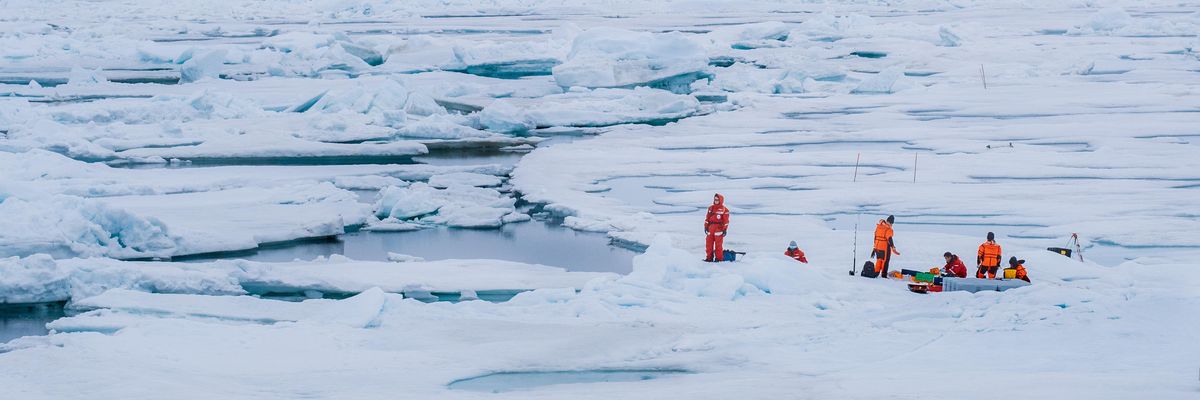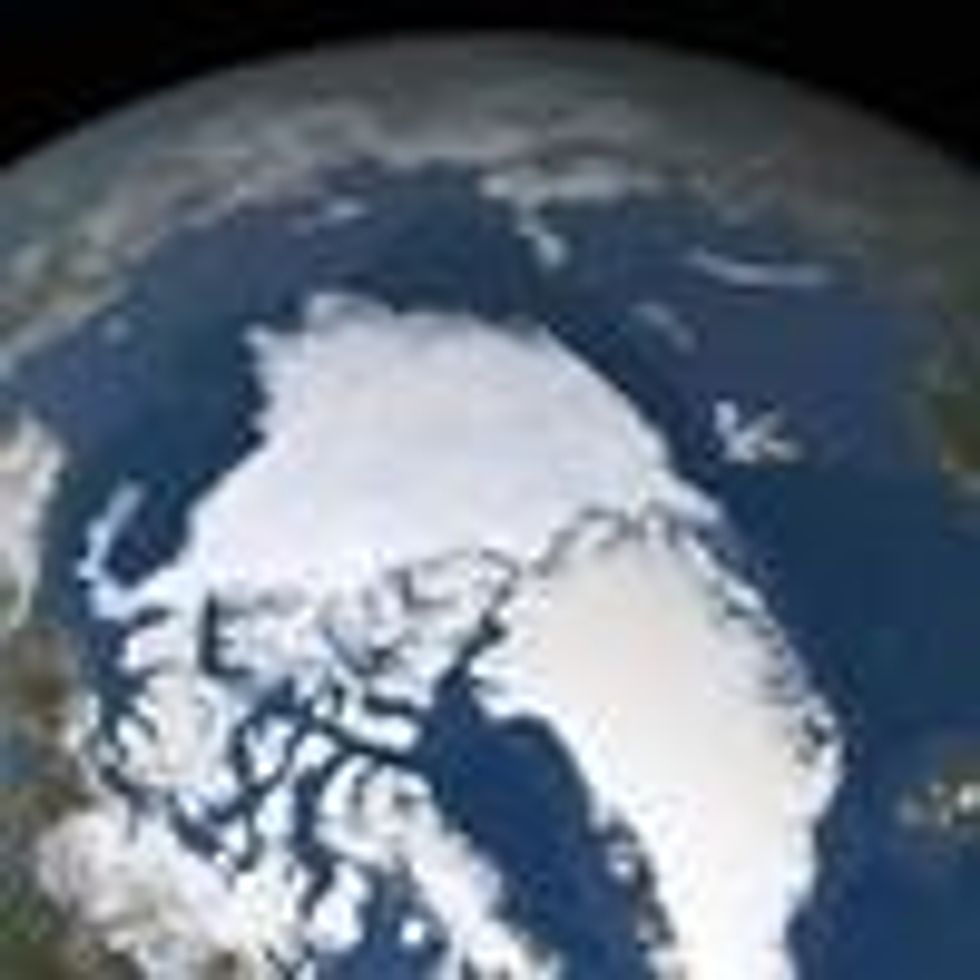

SUBSCRIBE TO OUR FREE NEWSLETTER
Daily news & progressive opinion—funded by the people, not the corporations—delivered straight to your inbox.
5
#000000
#FFFFFF
To donate by check, phone, or other method, see our More Ways to Give page.


Daily news & progressive opinion—funded by the people, not the corporations—delivered straight to your inbox.

Members of the MOSAiC expedition conduct Arctic research in 2019. (Photo: Alfred-Wegener-Institut /Lianna Nixon/CC-BY 4.0)
New research published Wednesday revealed the Arctic Ocean has been warming for decades longer than scientists previously understood, raising fresh concerns as the polar region faces the growing threat of a total loss of the seasonal ice that is crucial to the survival of the imperiled marine ecosystem.
"We're talking about the early 1900s, and by then we've already been supercharging the atmosphere with carbon dioxide."
A study published in Science Advances found that "the recent expansion of Atlantic waters into the Arctic Ocean"--a phenomenon knows as "Atlantification"--offers "undisputable evidence of the rapid changes occurring in this region."
"We reconstruct the history of Atlantification along the eastern Fram Strait during the past 800 years using precisely dated paleoceanographic records," the study's authors wrote, referring the the maritime passage between Greenland and Svalbard. "Our results show rapid changes in water mass properties that commenced in the early 20th century--several decades before the documented Atlantification by instrumental records."
Study co-author Tessi Tommaso of the Institute of Polar Sciences at the National Research Council in Bologna, Italy, said in a statement that "when we looked at the whole 800-year timescale, our temperature and salinity records look pretty constant. But all of a sudden at the start of the 20th century, you get this marked change in temperature and salinity--it really sticks out."
Francesco Muschitiello--one of the study's authors and a Cambridge University geographer--told CNN that "the Arctic Ocean has been warming up for much longer than we previously thought. And this is something that's a bit unsettling for many reasons, especially because the climate models that we use to cast projections of future climate change do not really simulate these type of changes."
"We're talking about the early 1900s, and by then we've already been supercharging the atmosphere with carbon dioxide," he continued. "It is possible that the Arctic Ocean is more sensitive to greenhouse gases than previously thought. This will require more research, of course, because we don't have a solid grip on the actual mechanisms behind this early Atlantification."
Related Content

In September, Common Dreams reported that Arctic sea ice shrank to its second-smallest extent since record-keeping began more than four decades ago.
The new study also follows research published September in the journal Earth's Future showing that the Last Ice Area--which is north of Canada and Greenland and is where the remaining summer sea ice will persist the longest as the climate emergency progresses--could disappear completely by 2100.
"Unfortunately, this is a massive experiment we're doing," study co-author Robert Newton, a climate researcher at Columbia University and co-author of the Last Ice Area study, said in a statement. "If the year-round ice goes away, entire ice-dependent ecosystems will collapse, and something new will begin."
Dear Common Dreams reader, The U.S. is on a fast track to authoritarianism like nothing I've ever seen. Meanwhile, corporate news outlets are utterly capitulating to Trump, twisting their coverage to avoid drawing his ire while lining up to stuff cash in his pockets. That's why I believe that Common Dreams is doing the best and most consequential reporting that we've ever done. Our small but mighty team is a progressive reporting powerhouse, covering the news every day that the corporate media never will. Our mission has always been simple: To inform. To inspire. And to ignite change for the common good. Now here's the key piece that I want all our readers to understand: None of this would be possible without your financial support. That's not just some fundraising cliche. It's the absolute and literal truth. We don't accept corporate advertising and never will. We don't have a paywall because we don't think people should be blocked from critical news based on their ability to pay. Everything we do is funded by the donations of readers like you. Will you donate now to help power the nonprofit, independent reporting of Common Dreams? Thank you for being a vital member of our community. Together, we can keep independent journalism alive when it’s needed most. - Craig Brown, Co-founder |
New research published Wednesday revealed the Arctic Ocean has been warming for decades longer than scientists previously understood, raising fresh concerns as the polar region faces the growing threat of a total loss of the seasonal ice that is crucial to the survival of the imperiled marine ecosystem.
"We're talking about the early 1900s, and by then we've already been supercharging the atmosphere with carbon dioxide."
A study published in Science Advances found that "the recent expansion of Atlantic waters into the Arctic Ocean"--a phenomenon knows as "Atlantification"--offers "undisputable evidence of the rapid changes occurring in this region."
"We reconstruct the history of Atlantification along the eastern Fram Strait during the past 800 years using precisely dated paleoceanographic records," the study's authors wrote, referring the the maritime passage between Greenland and Svalbard. "Our results show rapid changes in water mass properties that commenced in the early 20th century--several decades before the documented Atlantification by instrumental records."
Study co-author Tessi Tommaso of the Institute of Polar Sciences at the National Research Council in Bologna, Italy, said in a statement that "when we looked at the whole 800-year timescale, our temperature and salinity records look pretty constant. But all of a sudden at the start of the 20th century, you get this marked change in temperature and salinity--it really sticks out."
Francesco Muschitiello--one of the study's authors and a Cambridge University geographer--told CNN that "the Arctic Ocean has been warming up for much longer than we previously thought. And this is something that's a bit unsettling for many reasons, especially because the climate models that we use to cast projections of future climate change do not really simulate these type of changes."
"We're talking about the early 1900s, and by then we've already been supercharging the atmosphere with carbon dioxide," he continued. "It is possible that the Arctic Ocean is more sensitive to greenhouse gases than previously thought. This will require more research, of course, because we don't have a solid grip on the actual mechanisms behind this early Atlantification."
Related Content

In September, Common Dreams reported that Arctic sea ice shrank to its second-smallest extent since record-keeping began more than four decades ago.
The new study also follows research published September in the journal Earth's Future showing that the Last Ice Area--which is north of Canada and Greenland and is where the remaining summer sea ice will persist the longest as the climate emergency progresses--could disappear completely by 2100.
"Unfortunately, this is a massive experiment we're doing," study co-author Robert Newton, a climate researcher at Columbia University and co-author of the Last Ice Area study, said in a statement. "If the year-round ice goes away, entire ice-dependent ecosystems will collapse, and something new will begin."
New research published Wednesday revealed the Arctic Ocean has been warming for decades longer than scientists previously understood, raising fresh concerns as the polar region faces the growing threat of a total loss of the seasonal ice that is crucial to the survival of the imperiled marine ecosystem.
"We're talking about the early 1900s, and by then we've already been supercharging the atmosphere with carbon dioxide."
A study published in Science Advances found that "the recent expansion of Atlantic waters into the Arctic Ocean"--a phenomenon knows as "Atlantification"--offers "undisputable evidence of the rapid changes occurring in this region."
"We reconstruct the history of Atlantification along the eastern Fram Strait during the past 800 years using precisely dated paleoceanographic records," the study's authors wrote, referring the the maritime passage between Greenland and Svalbard. "Our results show rapid changes in water mass properties that commenced in the early 20th century--several decades before the documented Atlantification by instrumental records."
Study co-author Tessi Tommaso of the Institute of Polar Sciences at the National Research Council in Bologna, Italy, said in a statement that "when we looked at the whole 800-year timescale, our temperature and salinity records look pretty constant. But all of a sudden at the start of the 20th century, you get this marked change in temperature and salinity--it really sticks out."
Francesco Muschitiello--one of the study's authors and a Cambridge University geographer--told CNN that "the Arctic Ocean has been warming up for much longer than we previously thought. And this is something that's a bit unsettling for many reasons, especially because the climate models that we use to cast projections of future climate change do not really simulate these type of changes."
"We're talking about the early 1900s, and by then we've already been supercharging the atmosphere with carbon dioxide," he continued. "It is possible that the Arctic Ocean is more sensitive to greenhouse gases than previously thought. This will require more research, of course, because we don't have a solid grip on the actual mechanisms behind this early Atlantification."
Related Content

In September, Common Dreams reported that Arctic sea ice shrank to its second-smallest extent since record-keeping began more than four decades ago.
The new study also follows research published September in the journal Earth's Future showing that the Last Ice Area--which is north of Canada and Greenland and is where the remaining summer sea ice will persist the longest as the climate emergency progresses--could disappear completely by 2100.
"Unfortunately, this is a massive experiment we're doing," study co-author Robert Newton, a climate researcher at Columbia University and co-author of the Last Ice Area study, said in a statement. "If the year-round ice goes away, entire ice-dependent ecosystems will collapse, and something new will begin."